A Rainy Evening at Bahari Ghat
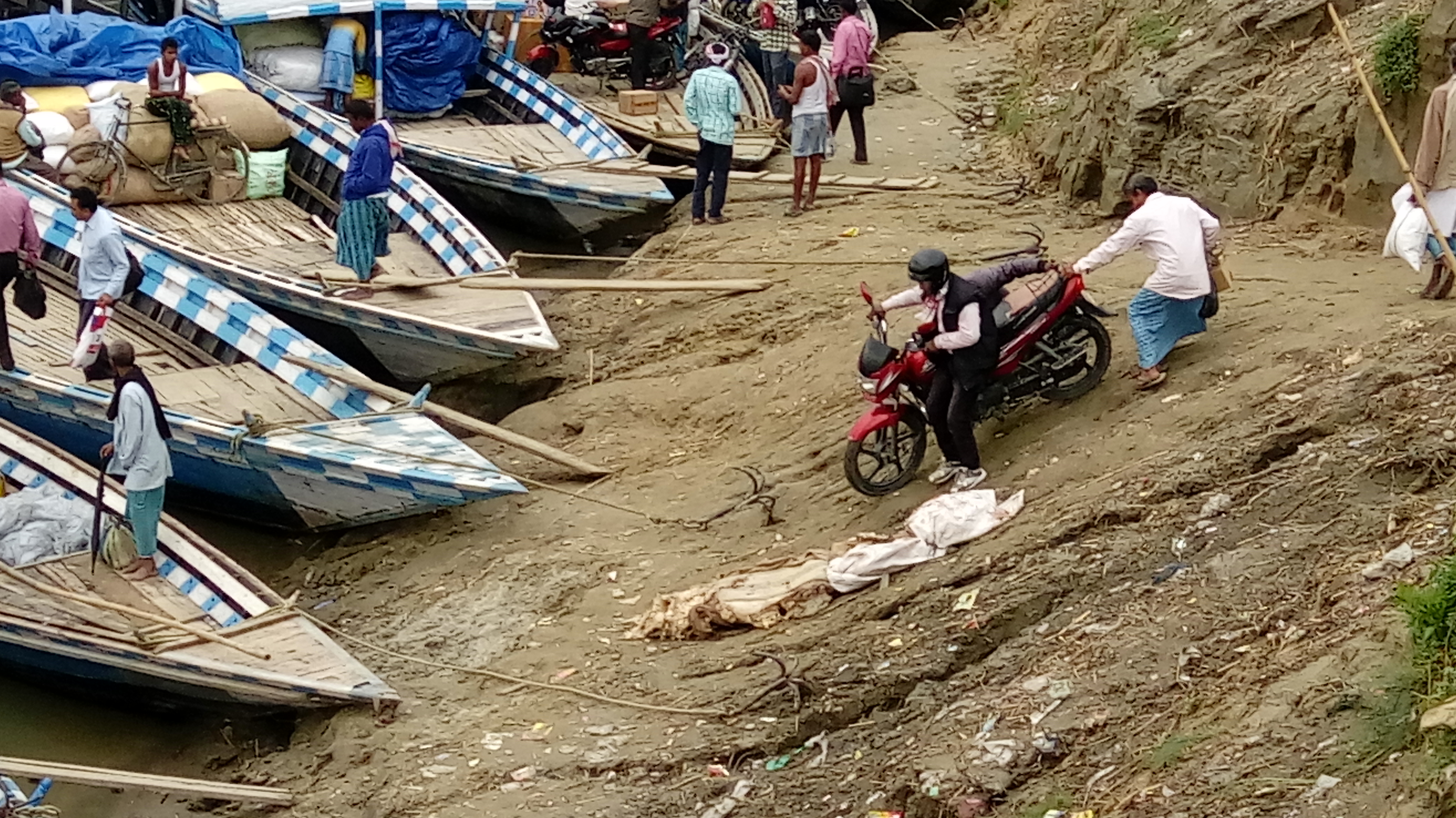 Poverty is often presented photogenic, but it cannot be just made looking beautiful. A travel note and photographs by MUHAMMED NOUSHAD.
Poverty is often presented photogenic, but it cannot be just made looking beautiful. A travel note and photographs by MUHAMMED NOUSHAD.
Mohibul Ali didn’t go to school and he does menial jobs in Mumbai. Now back home, on the shore of the mighty river Brahmaputra, there is a small house at Bahari village wherein he lives. A couple of buffaloes, owned by his father, graze in front of his tiny sheet-roofed abode. Sitting at his friend’s humble tea shop that serves tea and snacks to the villagers who depend on the ferrying boats to cross the Brahmaputra, he regrets about not having been educated. But he has learned to read, by himself. His two brothers and two sisters went to school. In the quality of life these siblings live today, no practical difference, however. How come you were left alone, when your siblings attended school, I ask. His answer is a smile. “We are very poor”; a statement you repeatedly hear from several men and women while visiting poor basthis. The camera you hold make them think that you would bring some difference. An obvious over-estimation of your power and commitment, and camera’s appeal. In a media saturated urban climate, rural poverty is nothing less than a nice footage for a contrast montage – an ethical under-estimation. From the next shop comes a baul song, and we listen. Mohibul knows its meaning and I don’t – he is mid-20s, a Bengali speaking Muslim. And in Assam, it carries unpleasant burdens.
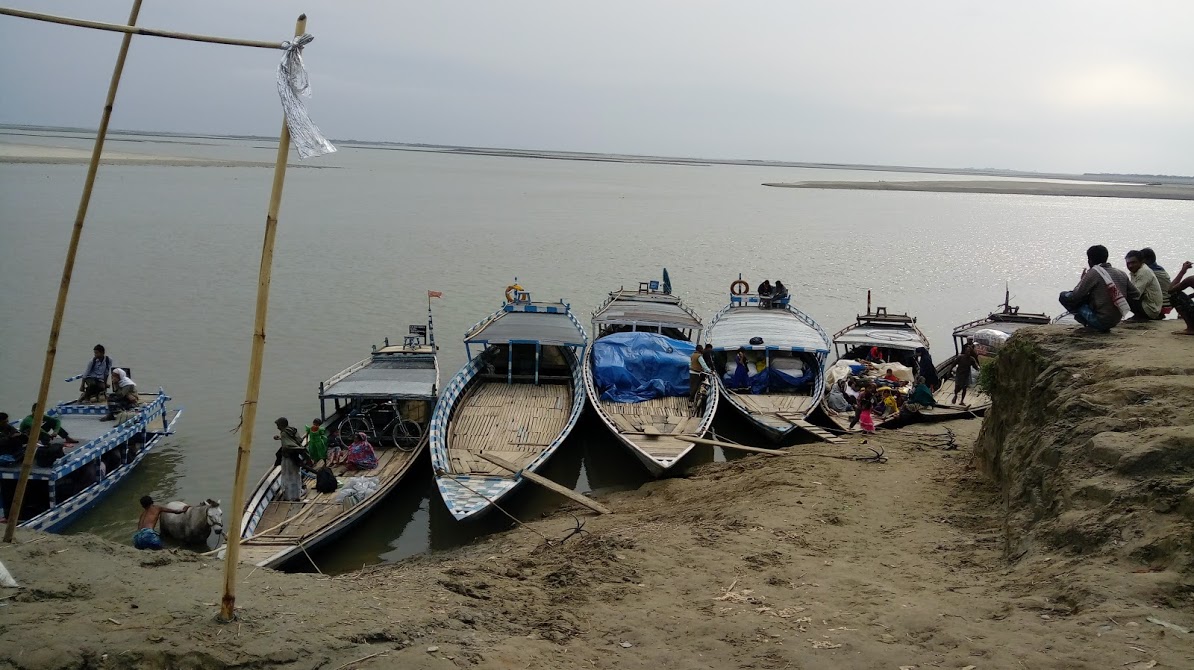 Bahari ghat is a humble embarkation point for hundreds of villagers going from the markets and farms and villages in lower Assam to upper Assam regions. A beautiful, rural riverside village in Barpeta district, Bahari is quite inconsequential in terms of “economy” or “development”. Known for its jute production, Bahari lies close to Changa town. In the evening we reached, this ghat market was bustling with life as several ferries were waiting for the passengers to fill and then set off. A few boats were reaching Bahari from the other side of the vast river, from some remote invisible villages. Quite a photographic delight! But soon, the evident impoverishment hurts you. Real poverty is painfully humble, it can’t afford to hide anything. The tiny box-like houses built with bamboos and mud scattered on both sides of the damaged, long-neglected road to the ghat. The very sight of the settlement and its people – tentatively built houses, half-naked children, shabbily dressed men and women, dirt and waste around – speaks of the suffering of these climate refugees.
Bahari ghat is a humble embarkation point for hundreds of villagers going from the markets and farms and villages in lower Assam to upper Assam regions. A beautiful, rural riverside village in Barpeta district, Bahari is quite inconsequential in terms of “economy” or “development”. Known for its jute production, Bahari lies close to Changa town. In the evening we reached, this ghat market was bustling with life as several ferries were waiting for the passengers to fill and then set off. A few boats were reaching Bahari from the other side of the vast river, from some remote invisible villages. Quite a photographic delight! But soon, the evident impoverishment hurts you. Real poverty is painfully humble, it can’t afford to hide anything. The tiny box-like houses built with bamboos and mud scattered on both sides of the damaged, long-neglected road to the ghat. The very sight of the settlement and its people – tentatively built houses, half-naked children, shabbily dressed men and women, dirt and waste around – speaks of the suffering of these climate refugees.
Brahmaputra beats them down every year. The water rises, the land slides, the shore erodes and they have no option but to leave their bamboo or sheet houses to temporarily stay with relatives in nearby villages or in makeshift tents in the town markets. They come back when the water subsides. Many children, like Mohibul Ali, never find their way to schools. Poverty is not beautiful; particularly when it is imposed upon a people, when it is systemic and historic. It may be photogenic. But it will be unfair to make it look just beautiful.
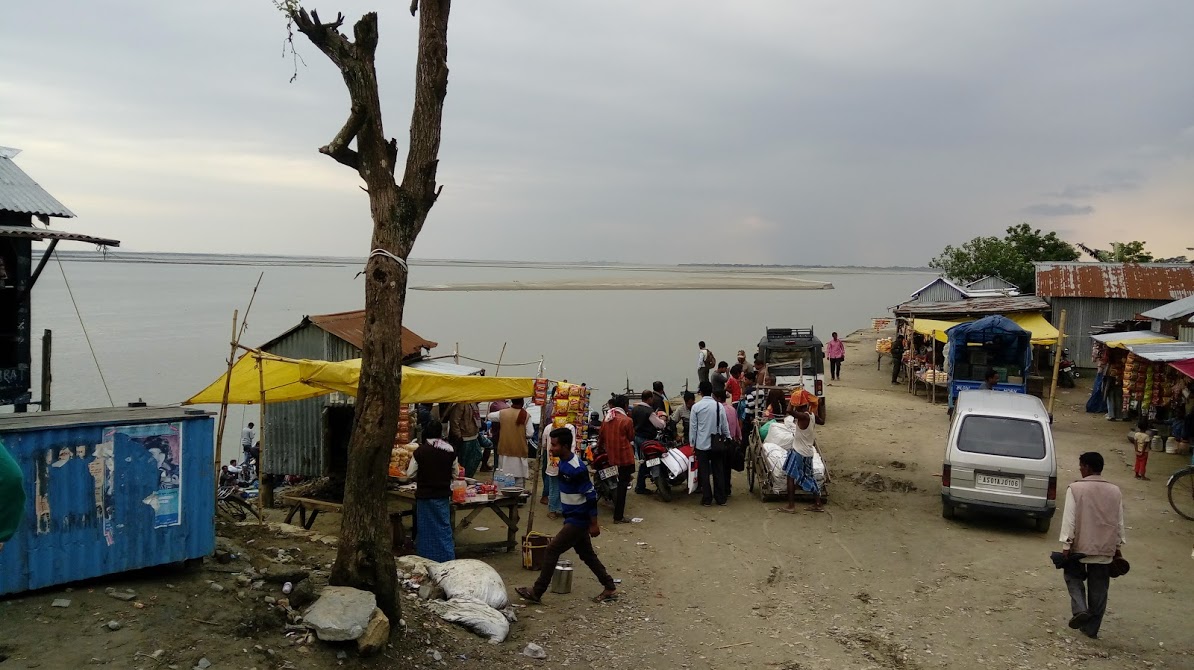 And these climate refugees, being a floating population every year, bear the brunt of being called illegal migrants from Bangladesh. The fact that they speak Bengali and they are Muslims make them easily vulnerable to this malicious, life-threatening allegation. Assam’s mainstream psyche, from prominent political parties to Bodo militant groups, share the same violent perception. In spite of being in this land for generations, Bengali speaking Muslims in Assam, particularly in Muslim majority districts, are always asked to prove their Indianness. Nellie massacre took away 3000 lives in 1983, and none yet punished for the gruesome violence; and the Bodo instigated anti-Muslim pogrom in 2012, caused around more than 100 deaths. Displacement and other loss is immeasurable. Muslims in Bahari are mostly Bengali speaking Muslims.
And these climate refugees, being a floating population every year, bear the brunt of being called illegal migrants from Bangladesh. The fact that they speak Bengali and they are Muslims make them easily vulnerable to this malicious, life-threatening allegation. Assam’s mainstream psyche, from prominent political parties to Bodo militant groups, share the same violent perception. In spite of being in this land for generations, Bengali speaking Muslims in Assam, particularly in Muslim majority districts, are always asked to prove their Indianness. Nellie massacre took away 3000 lives in 1983, and none yet punished for the gruesome violence; and the Bodo instigated anti-Muslim pogrom in 2012, caused around more than 100 deaths. Displacement and other loss is immeasurable. Muslims in Bahari are mostly Bengali speaking Muslims.
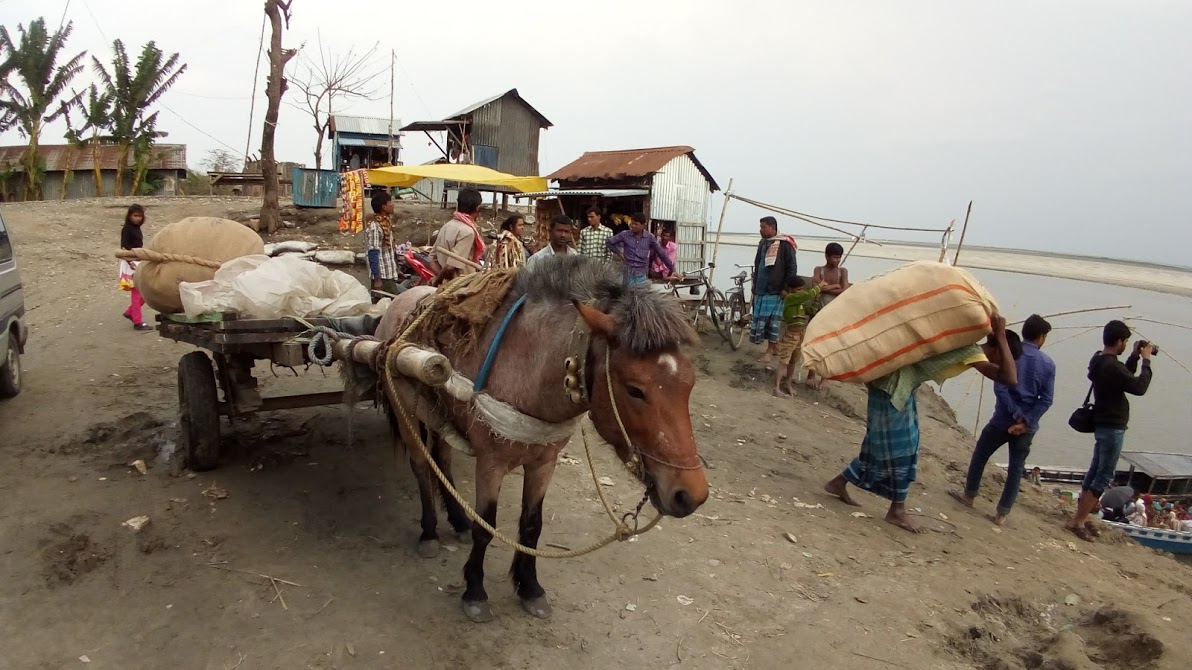 When we reached Bahari, there were nearly ten large passenger boats waiting to set off. Men, women and children waited in the boats to start. All boats had a small roof where people can shelter themselves when the downpour starts. The deck were filled with agricultural produces and goods purchased from Barpeta markets. Horse carts were at the ghat and sacks were being unloaded and loaded. Nobody had cared to make steps or jetty in the riverbed.
When we reached Bahari, there were nearly ten large passenger boats waiting to set off. Men, women and children waited in the boats to start. All boats had a small roof where people can shelter themselves when the downpour starts. The deck were filled with agricultural produces and goods purchased from Barpeta markets. Horse carts were at the ghat and sacks were being unloaded and loaded. Nobody had cared to make steps or jetty in the riverbed.
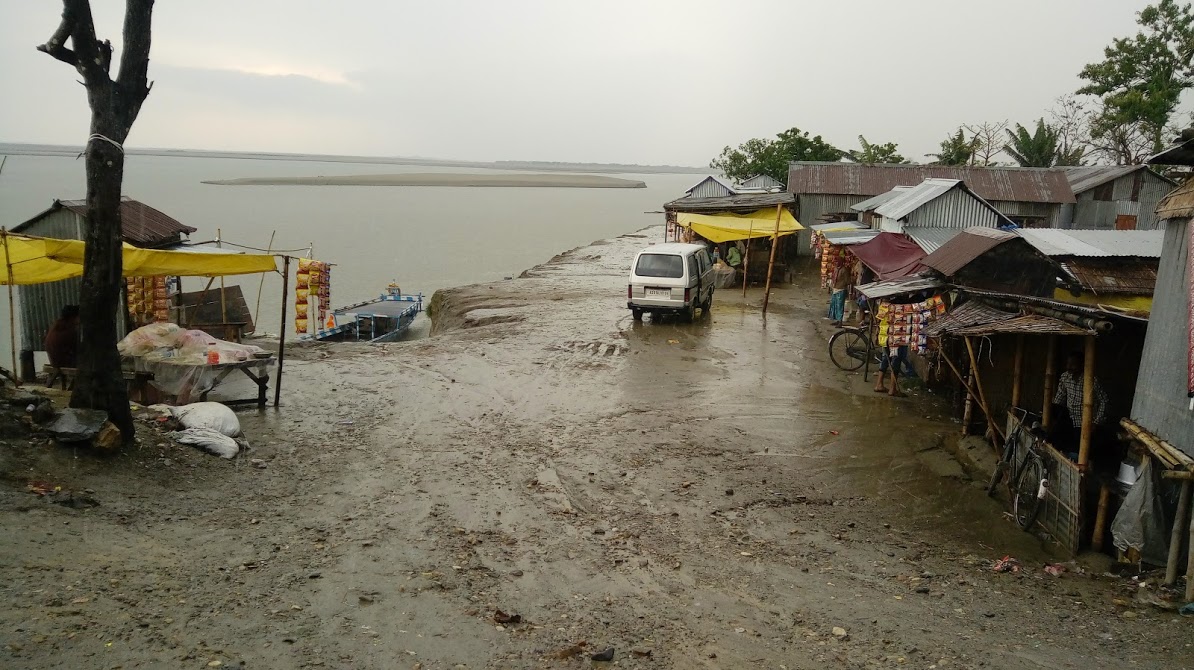 My friend Suhail, working with the Darul Huda Islamic University Assam off-campus center at Baisha, told me that there are island villages in Brahmaputra where people live an almost isolated life. He offered help in accessing such villages next time. How long it takes to reach your place, I ask a villager. One or one and half hours. It costs ten rupees in government boat and 30 rupees in private boats. We spent time at the ghat, shooting and interacting with locals, drinking many teas, then it started raining heavily. We noticed that all boats except two had left anticipating the rain.
My friend Suhail, working with the Darul Huda Islamic University Assam off-campus center at Baisha, told me that there are island villages in Brahmaputra where people live an almost isolated life. He offered help in accessing such villages next time. How long it takes to reach your place, I ask a villager. One or one and half hours. It costs ten rupees in government boat and 30 rupees in private boats. We spent time at the ghat, shooting and interacting with locals, drinking many teas, then it started raining heavily. We noticed that all boats except two had left anticipating the rain.
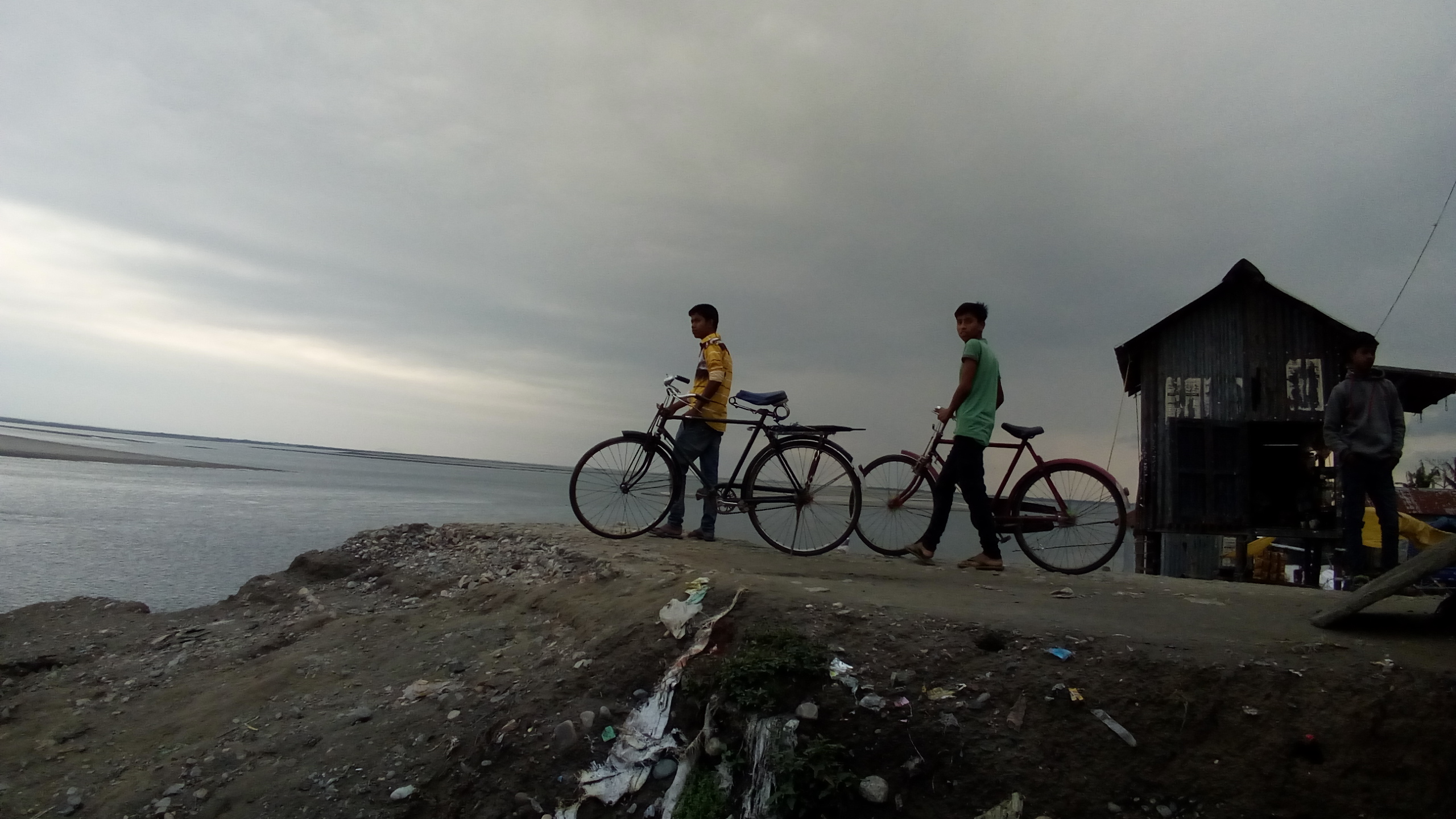 Biman, a Bengali teacher who was employed in a primary school across the Brahmaputra, reached late at the ghat. As heavy downpour made him arrive late, his boats had left. He was not fully happy about his posting at the remote village, mostly due to the conveyance difficulties. Ganges has a minister and Brahmaputra is a neglected river, he complained. He reminded us that the Brahmaputra festival had been going on in Guwahati; and even recommended to see it. It was already 4.30 in the evening and almost all boats gone. The sun sets by 5.30. Would he get a boat today? He looked across the river through the drizzle and said, may be. “If not, I would go to my relative living in the nearby village and catch the boat tomorrow morning.” Waiting and hope. It is beyond your control. The river is muddy, murky and has always been furious. The rain intensified and slowly the small shops, around 10 or 15, were closed.
Biman, a Bengali teacher who was employed in a primary school across the Brahmaputra, reached late at the ghat. As heavy downpour made him arrive late, his boats had left. He was not fully happy about his posting at the remote village, mostly due to the conveyance difficulties. Ganges has a minister and Brahmaputra is a neglected river, he complained. He reminded us that the Brahmaputra festival had been going on in Guwahati; and even recommended to see it. It was already 4.30 in the evening and almost all boats gone. The sun sets by 5.30. Would he get a boat today? He looked across the river through the drizzle and said, may be. “If not, I would go to my relative living in the nearby village and catch the boat tomorrow morning.” Waiting and hope. It is beyond your control. The river is muddy, murky and has always been furious. The rain intensified and slowly the small shops, around 10 or 15, were closed.
[This was originally published in Change News website: http://changenews.org/?p=1860]